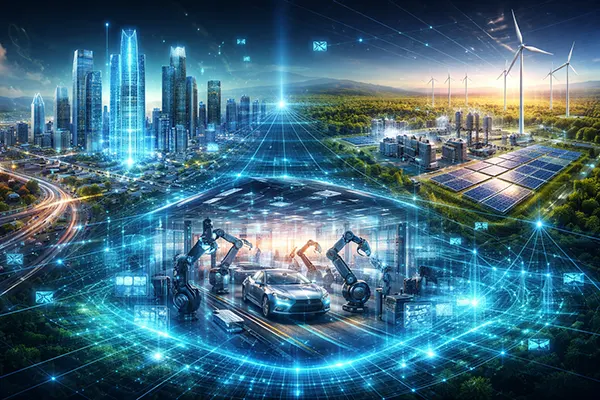
The Future is Now: How AI is Transforming Our World
The realm of Artificial Intelligence (AI) has expanded beyond the confines of science fiction to become a pivotal part of our daily lives and the fabric of our future. This transformative technology, once a mere figment of imaginative speculation, is now a dynamic force driving innovation across various sectors.
What is artificial intelligence?
At its core, artificial intelligence is a branch of computer science dedicated to creating systems capable of performing tasks that typically require human intelligence. These tasks include learning, decision-making, problem-solving, and understanding natural language. AI integrates a multitude of technologies, including machine learning, natural language processing, and robotics, to enable machines to emulate human cognitive functions.
The evolution of AI has been fueled by advances in data collection, storage capabilities, and computational power. These advancements have enabled the development of algorithms that can analyze vast datasets to learn and make informed decisions. AI’s capacity to continuously improve through experience mimics the learning process of humans, setting the stage for machines that can adapt and evolve over time.
How it works and what it is capable of now
Artificial intelligence operates through machine learning, where algorithms are trained using large sets of data to recognize patterns and make predictions. Deep learning, a subset of machine learning, utilizes neural networks with multiple layers to process complex data inputs, facilitating more sophisticated learning and decision-making capabilities.
Today, AI’s capabilities extend across various domains, from automating routine tasks to solving complex problems. In healthcare, AI algorithms analyze medical images to assist in diagnosing diseases. In finance, AI systems detect fraudulent activities and automate trading. Meanwhile, in everyday life, AI powers personal assistants, recommendation systems, and autonomous vehicles, showcasing its versatility and potential to enhance human capabilities.
The implementation of AI in robotics has also seen remarkable advancements. Robots equipped with AI algorithms can interact with their environment, learn from their experiences, and perform tasks with increasing autonomy. This convergence of robotics and AI is paving the way for innovative applications, from industrial automation to service robots assisting in homes and businesses.
Where it already helps people and where it is used
Artificial intelligence is making significant contributions in various fields, positively impacting people’s lives. In healthcare, AI systems are revolutionizing patient care through early detection of diseases, personalized treatment plans, and robotic surgeries. In education, AI enables personalized learning experiences, adapting to each student’s pace and style of learning.
In the realm of environmental conservation, AI aids in monitoring climate change, predicting natural disasters, and managing wildlife conservation efforts. AI’s role in public safety includes enhancing security through facial recognition technologies and improving emergency response through predictive analytics.
The agricultural sector benefits from AI through precision farming, where data-driven insights help in optimizing crop yields and reducing waste. Furthermore, AI in entertainment has transformed content creation, recommendation systems, and interactive gaming experiences, enriching cultural consumption.

How he manifests himself there
In each of these sectors, AI manifests its potential through increased efficiency, accuracy, and innovation. In healthcare, AI-driven diagnostics offer faster and more accurate assessments, potentially saving lives through early intervention. In education, AI’s adaptability fosters a more inclusive and effective learning environment, catering to diverse educational needs and learning styles.
In environmental efforts, AI’s predictive capabilities enable proactive measures against climate change, enhancing our ability to safeguard the planet. In agriculture, AI’s precision and data analysis lead to sustainable farming practices, ensuring food security while minimizing environmental impact.
Where else it can be applied
Looking ahead, the applications of AI are boundless. In urban development, AI can optimize traffic management, energy consumption, and infrastructure planning, leading to smarter, more sustainable cities. In space exploration, AI could autonomously navigate spacecraft, analyze celestial data, and manage life-support systems, expanding the horizons of human exploration and discovery.
The potential of AI in enhancing global communication is profound. With advancements in natural language processing, AI can break down language barriers, facilitating instant and accurate translation services, fostering a more interconnected world. The fusion of AI with emerging technologies like blockchain and the Internet of Things (IoT) heralds a new era of innovation, security, and efficiency across all spheres of life.
As we stand on the cusp of this AI-driven era, it is imperative to navigate the ethical and societal implications of this technology thoughtfully. The future shaped by AI holds immense promise, but it also demands a collective effort to ensure that the benefits of AI are accessible to all, fostering a world where technology amplifies human potential without compromising our values or autonomy.
Popular articles
-
 Recycling Lithium and Critical Metals: How...
Recycling Lithium and Critical Metals: How...In 2026, Europe’s approach to lithium and critical metals is no longer …
Learn more -
 Next-Gen PFAS Water Filters: Sorbents and ...
Next-Gen PFAS Water Filters: Sorbents and ...PFAS in drinking water is no longer a niche issue: by 2026, …
Learn more -
 Digital twins in 2025–2026: real city, fac...
Digital twins in 2025–2026: real city, fac...Digital twins have moved well beyond the “nice-to-have” stage. In 2025 and …
Learn more
